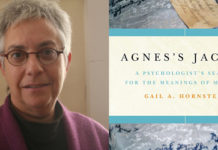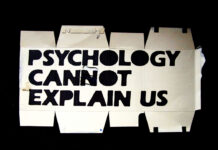First-Person Accounts of Madness and Global Mental Health: An Interview with Dr. Gail Hornstein
Dr. Gail Hornstein, author of Agnes’s Jacket: A Psychologist’s Search for the Meanings of Madness, discusses the importance of personal narratives and service-user activism in the context of the global mental health movement.
Restricting Pharma Reps Contact with Docs Decreases Prescriptions
Implementing policies that regulate pharmaceutical sales representatives’ interaction with physicians may reduce prescription of promoted drugs.
“Kids in Foster Care Three Times More Likely to be Diagnosed with ADHD”
PsychCentral presents a new study from the Center for Disease Control and Prevention (CDC) that found that foster care children are three times more likely than other children on Medicaid to receive a diagnosis of ADHD. Overall, more than one in four children in foster care receive such a diagnosis. CDC statistician Melissa Danielson interpreted these results as revealing a “substantial need” for more medical and behavioral services for kids in foster care.
Withdrawal Symptoms Routinely Confound Findings of Psychiatric Drug Studies
Researchers examine how rapid discontinuation can mimic the relapse of mental health symptoms and confound psychiatric drug studies.
Critics Push WHO to Remove Transgender from List of Mental Illnesses
The World Health Organization (WHO) currently lists being transgender as a medical condition and mental illness. Critics argue that the world’s leading health organization...
“More Patients in Scotland Given Antidepressants”
The BBC reports that the number of people in Scotland taking antidepressants has increased by 5% in the past year with most of the patients being women and those in the poorest parts of the country. “We are now looking at the flabbergasting statistic of more than one in seven people in Scotland being prescribed antidepressants this year,” Conservative health spokesman Jackson Carlaw said. “We urgently have to look at better alternatives than simply parking people on medication in the hope things don't get any worse, with no aspiration for complete recovery."
An Alternative Perspective on Psychotherapy: It is Not a ‘Cure’
Kev Harding argues against conceptualizations of therapy as a ‘cure’ to an ‘illness’ and instead offers alternative approaches.
‘A Little Bit of OCD’: The Downside of Mental Health Awareness
From The Guardian: People often claim to experience mental health problems only to excuse their unpleasant or hurtful behaviors. This can exacerbate prejudice toward those...
Researchers Argue that ‘ADHD’ Doesn’t Meet DSM Definition of a Disorder
New research questions whether the diagnosis of ADHD even meets the criteria for a disorder, as set out in the manuals used by the medical and psychiatric fields.
Psychology Must Become a Sanctuary Discipline to Heal Racial Trauma
Researchers explore pathways of healing racial trauma in Latinx immigrant communities.
Effects of Racism on Depression in Black College Women
Black college women endorse more perceived stress and depressive symptoms than White college women, highlighting the impacts of racism.
Case Study of Liberation Approach to International Mental Health Care
Study in Brazil demonstrates how the exploration of contextual determinants of distress in mental health care can inform therapeutic change.
“Bad Science and Such Big Portions–Drug-Company Funded CMEs Fall Out of Favor”
For the USC Center for Health Journalism, Martha Rosenberg points out the absurdity of allowing industry funded doctors to teach classes to practitioners about psychiatric drugs. "What if the written road test drivers take were sponsored by BP or Shell and had marketing messages interspersed?"
Study Calls for Consensus on Overdiagnosis Across Medical Disciplines
Lack of overdiagnosis parameters stifles communication across fields seeking to mitigate its potential harm.
Researchers Make a Case for a “Theory of Nothing” in Psychology
What meaning do psychological constructs really hold, and how are they operationalized and statistically modeled within psychology research?
Mental Health Disability Claims Continue to Climb
According to new research by Joanna Moncrieff and Sebastião Viola, mental health problems have become the leading cause of disability claims in the UK. While the overall number of claims for other conditions has decreased by 35%, claims related to “mental disorders” have increased 103% since 1995.
“California Moves to Stop Misuse of Psychiatric Meds in Foster Care”
On Tuesday, NPR told the story of DeAngelo Cortijo. DeAngelo became a foster kid at age 3 after his mother attempted suicide. He was “diagnosed with bipolar and anxiety disorders, attachment disorder, intermittent explosive disorder or posttraumatic stress disorder,” and was prescribed “a combination of antipsychotics, antidepressants and stimulants, and was told that taking them was his only hope of being normal.” Through equine therapy, DeAngelo was eventually able to get off all of his medication. Now, California is hoping to pass reforms that would prevent foster kids, like DeAngelo, from being “prescribed antipsychotic drugs at double to quadruple the rate of that not in foster care.”
California Foster Care Physicians Taking Double the Average in Pharma Money
Drug companies spent over $14 million from 2010 to 2013 to "woo" California doctors who specialize in treating foster children, according to part three...
Epidemiologists Decry Major Problems in US Psychiatric Practice
In an exchange published in the Journal of Clinical Epidemiology, researchers take turns highlighting major problems in the way psychiatry is currently practiced in the United States. In response to an article by Vinay Prasad calling for an insistence on randomized control trials in “evidence-based” medicine, Jose de Leon, from the Mental Health Research Center at the University of Kentucky begins the back-and-forth by pointing out that this type of evidence has been detrimental to the field of mental health.
“Direct-to-Consumer Advertising — Selling Drugs or Diseases?”
With the American Medical Association (AMA) declaring its opposition to direct-to-consumer (DTC) drug advertising, Martha Rosenberg asks, did DTC increase the number of people who have "diseases"?
Financial Difficulties Facing College Students Lead to Mental Health Issues
A new study published open-access this month in Community Mental Health Journal finds that the increased financial difficulties facing college students lead to greater...
Increasing Physical Activity in Schools May Improve Mental Health
A new article suggests integrating physical activity throughout the day may help to address the mental health of students.
Dissecting the DSM Debate: Researchers Analyze Critiques Across Audiences
A new study systematically explores critical reactions to the DSM-5 and identifies unifying themes.
Still Mistreating the Elderly with Psychiatric Drugs: Antipsychotics
The percentage of seniors in the United States prescribed potentially deadly antipsychotic drugs increases with age. A new study reveals that in the face of serious risks of strokes, fractures, kidney injuries, and death, over seventy-five percent of seniors given antipsychotics do not have a diagnosis for a mental disorder.
Racism Linked to Poor Health Outcomes in Children
New study finds children who have been exposed to discrimination show higher likelihood of anxiety, depression, and ADHD.
























